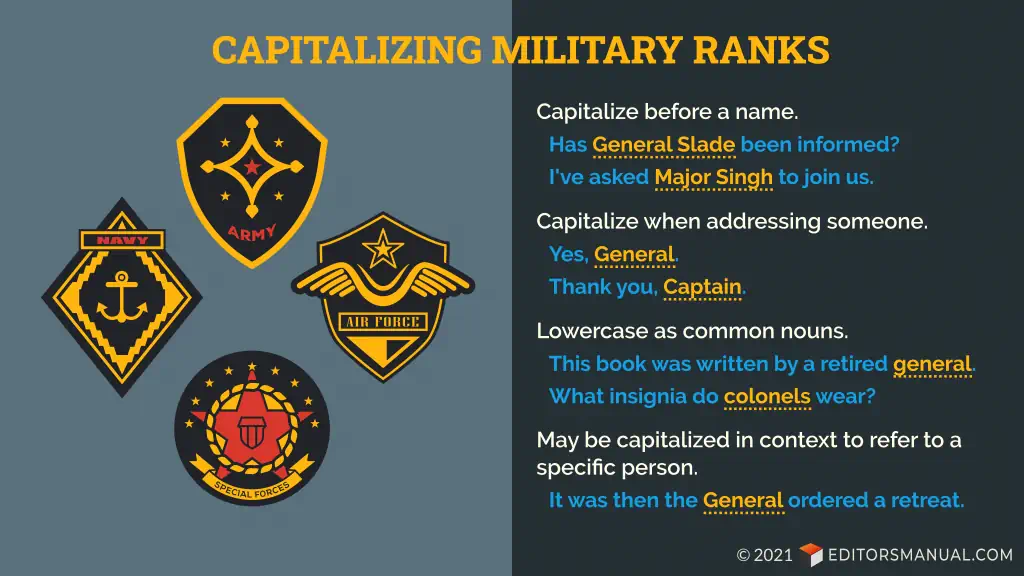Are Military Ranks Capitalized?
Summary
Military titles like general, colonel, admiral, major, and captain are capitalized when used before a name or to address someone.
- Have you sent the files to General Green?
- Here are the files you wanted, General.
But when used as common nouns, military ranks are generally lowercased.
- This book was written by a retired general.
Military titles
Military ranks or titles like general, colonel, captain, and major are often capitalized in documents and publications of the armed forces and in news stories. In general, capitalize such words only when they are used as part of a name or in place of one. Otherwise, lowercase them when used as common nouns.
- Four colonels report directly to General Hawkins.
- Each captain will then individually meet Colonel Hays.
- The order was signed by a brigadier general, General Rodriguez.
When to capitalize
Capitalize military ranks like general, captain, admiral, and major when you use them as titles before a name.
- Was General Cooper present in the room?
- The frigate was launched in 1961 by Admiral Schmidt.
- Have Commander Andersen and Lieutenant Jones been informed?
- The military’s plans to counter the alien invasion were reviewed this morning by General Green.
- This is Colonel James Robertson.
- I have a message for Lieutenant Sanders.
- It was Major Singh who sent the message.
- We were unprepared when Captain Dashwood finally gave the order to attack.
- The orientation was led by Master Sergeant Gomez.
- Where is Private Brown?
Also capitalize military titles when addressing a member of the military.
- Your car is here, General.
- Welcome to the launch, Admiral.
- Hello, Colonel, how are you?
- Aye aye, Commodore.
- Right away, Lieutenant.
- They’re ready for you now, Major.
- We were unprepared, Captain.
- Yes, Staff Sergeant!
- Thank you, Private, that will be all.
Polite forms of address like sir and ma’am are generally not capitalized.
- No, sir.
- Yes, ma’am.
Military ranks may also be capitalized to refer to a specific person.
- During the meeting, the General emphasized the need for transparency.
a specific general, the one chairing the meeting
- At 0630 hours, the Colonel gave the order to fire.
the colonel leading the battalion
Words such as army and navy are capitalized when used to refer to a specific army or navy.
- the U.S. Army, the Royal Air Force, the Royal Canadian Navy
- a lieutenant in the Navy
acceptable when used as a proper noun (e.g., to mean “the U.S. Navy”)
But when these words are used as common nouns, they are lowercased as usual.
- Youth in the hinterlands must either join the army or travel to cities in search of jobs.
- For seven days, the two armies fought for control of the land.
- This country needs a stronger air force to protect its skies.
- Our navy was clearly stronger than theirs.
When not to capitalize
Don’t capitalize words like general, major, and captain when they are used as common nouns—for example, when preceded by a determiner like the or used in the plural.
- A general generally does not command troops but plans operations.
- In the absence of the captain, the sergeant must take command of the platoon.
- Jennifer Schmidt is a published author and retired admiral.
- Anand’s wife is a captain in the Navy.
- Neither the commander nor the lieutenant is available.
Military ranks are often capitalized when used in context to refer to a specific member of the armed forces.
- After the ceremony, the Admiral will be invited to join other distinguished guests on the boat.
a specific admiral, already referred to earlier in the document
- The General will then take questions from the students.
In formal writing, however, avoid capitalizing military titles used simply as common nouns.
Other titles
In general, civil, official, academic, royal, and religious titles are capitalized when they appear before a name or are used in place of one. Otherwise, such words are generally lowercased.
- The act was signed into law by President Obama.
- Here are the documents, Madam President.
- I met Bishop Morales at a conference last year.
- We will discuss the new policy with Principal Wong.
- Five former presidents attended the funeral.
- This book was written by a bishop of the nineteenth century.
- The principal will address the students this afternoon.

